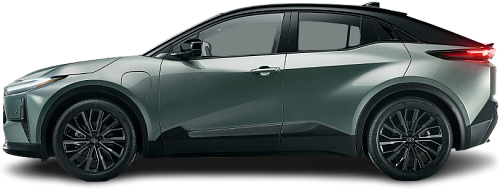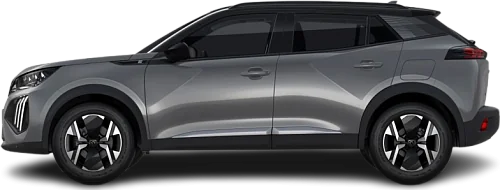USA EV Comparison: Toyota C-HR+ 57.7 kWh FWD vs Peugeot e-2008 54 kWh
Struggling to Decide? Let AI Help!
Your AI Summary Is Ready!
General Info
While the Peugeot e-2008 54 kWh (2023-…) is currently produced, it is not offered for sale in the United States. The Toyota C-HR+ 57.7 kWh FWD (2025-…) is announced, but not yet in production.
The two vehicles share the same body style: SUV.
| Property | Toyota C-HR+ 57.7 kWh FWD | Peugeot e-2008 54 kWh |
|---|---|---|
| Years of Production | 2025-… | 2023-… |
| Current Status | Announced | Produced |
| Country of Manufacture | Japan, China | China, Spain |
| Body Style | SUV | SUV |
| Market Availability | EU, USA | EU |
| GCC Score | 6 | 5.5 |
Range and Efficiency
The Toyota C-HR+ 57.7 kWh FWD (2025-…) boasts a greater real-world range, a larger battery, and superior energy efficiency compared to the Peugeot e-2008 54 kWh (2023-…).
| Property | Toyota C-HR+ 57.7 kWh FWD | Peugeot e-2008 54 kWh |
|---|---|---|
| Range (WLTP) | 283 mi | 252 mi |
| Range (GCC) | 240 mi | 214 mi |
| Battery Capacity (Nominal) | 57.7 kWh | 54 kWh |
| Battery Capacity (Usable) | 51.9 kWh | 50.8 kWh |
| Efficiency per 100 mi | 21.6 kWh/100 mi | 23.7 kWh/100 mi |
| Efficiency per kWh | 4.62 mi/kWh | 4.21 mi/kWh |
| Range and Efficiency Score | 8.1 | 7.1 |
Charging
Both vehicles utilize a standard 400-volt architecture.
The Toyota C-HR+ 57.7 kWh FWD (2025-…) offers faster charging speeds at DC stations, reaching up to 150 kW, while the Peugeot e-2008 54 kWh (2023-…) maxes out at 100 kW.
The Toyota C-HR+ 57.7 kWh FWD (2025-…) features a more powerful on-board charger, supporting a maximum AC charging power of 11 kW, whereas the Peugeot e-2008 54 kWh (2023-…) is limited to 7.4 kW.
| Property | Toyota C-HR+ 57.7 kWh FWD | Peugeot e-2008 54 kWh |
|---|---|---|
| Max Charging Power (AC) | 11 kW | 7.4 kW |
| Max Charging Power (DC) | 150 kW | 100 kW |
| Architecture | 400 V | 400 V |
| Charge Port | Tesla (NACS) | CCS Type 2 |
| Charging Score | 5.9 | 4.4 |
Performance
Both vehicles are front-wheel drive.
The Toyota C-HR+ 57.7 kWh FWD (2025-…) boasts greater motor power and accelerates faster from 0 to 60 mph.
| Property | Toyota C-HR+ 57.7 kWh FWD | Peugeot e-2008 54 kWh |
|---|---|---|
| Drive Type | FWD | FWD |
| Motor Type | PMSM | PMSM |
| Motor Power (kW) | 123 kW | 115 kW |
| Motor Power (hp) | 165 hp | 154 hp |
| Motor Torque | 168 lb-ft | 192 lb-ft |
| 0-60 mph | 8.3 s | 8.7 s |
| Top Speed | 99 mph | 93 mph |
| Performance Score | 3 | 2.9 |
Dimensions
The Toyota C-HR+ 57.7 kWh FWD (2025-…) is longer, wider, and taller.
The Toyota C-HR+ 57.7 kWh FWD (2025-…) boasts a more extended wheelbase.
| Property | Toyota C-HR+ 57.7 kWh FWD | Peugeot e-2008 54 kWh |
|---|---|---|
| Length | 178 in | 169.4 in |
| Width (with Mirrors) | - Width (with Mirrors) | 78.2 in |
| Width (w/o Mirrors) | 73.6 in | 69.9 in |
| Height | 62.8 in | 60 in |
| Wheelbase | 108.3 in | 100.9 in |
Cargo and Towing
Neither car is equipped with a frunk (front trunk).
Neither vehicle is officially rated for towing in the US.
| Property | Toyota C-HR+ 57.7 kWh FWD | Peugeot e-2008 54 kWh |
|---|---|---|
| Number of Seats | 5 | 5 |
| Curb Weight | - Curb Weight | 3578 lb |
| Cargo Volume (Trunk) | 14.7 ft3 | 15.3 ft3 |
| Cargo Volume (Max) | - Cargo Volume (Max) | 51.8 ft3 |
| Cargo Volume (Frunk) | - Cargo Volume (Frunk) | - Cargo Volume (Frunk) |
| Towing Capacity | - Towing Capacity | - Towing Capacity |
| Cargo and Towing Score | 6.3 | 5.3 |




